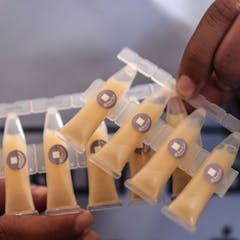
Articles sur Water and sanitation
Ensemble des articles

‘Water-shifting’ should not be a permanent measure. It does not address the cause of the current crisis.

A webinar hosted by The Conversation brings together experts in law, health, policy and Indigenous affairs to explain some of the most pressing problems related to water in the US.

The aim of vaccination is to prevent infection. In addition, vaccination is intended to reduce the risk of severe illness.

In hospitals, infection prevention and control cannot be met without a hygienically clean, and safe environment that has an adequate supply of clean running water.

Lowering spatial inequalities can reduce economic and social inequities.

Evidence suggests that involving marginalised communities in setting priorities and designing collective action can lead to improved health outcomes.

Progress against neglected tropical diseases is now at real risk of reversal as a result of the COVID-19 pandemic.

Should the U.S. help low-income households afford water service, as it does with heating and groceries? Chile does. An economist explains how it works there and how it could work here.

The 2021 local government elections signals widespread disillusionment with representative democracy that only a sea change in service delivery can fix.

Treatment rates are still low in many developing countries.

The demon is not density but rather that African countries have not planned and made the investments necessary to manage the downsides of the type of density found in informal settlements.

The inequalities in South Africa’s education are systematically being exposed at a scale not experienced before.

While small businesses will be partially cushioned by government support measures, there’s no support for the most vulnerable workers.

If you want to live like a local when on holiday, you should defecate like one.

Much of the discussion about “Take a Knee” has overlooked the issues of justice and social exclusion, and especially environmental matters. That’s something to think about during the Super Bowl.

Developing a map of African countries’ water poverty levels offers a transparent analysis for policymakers, governments and organisations that deal with water issues.

It’s a dirty scientific job – but it could save lives.

Progress in terms of water and sanitation has traditionally favoured those with money. But the hope with the SDG’s is that this gap will be plugged in the future.

There have been modest improvements in water and sanitation provision in Africa, but there is still a long way to go. Most citizens rate their governments’ performance in this sphere poorly.
